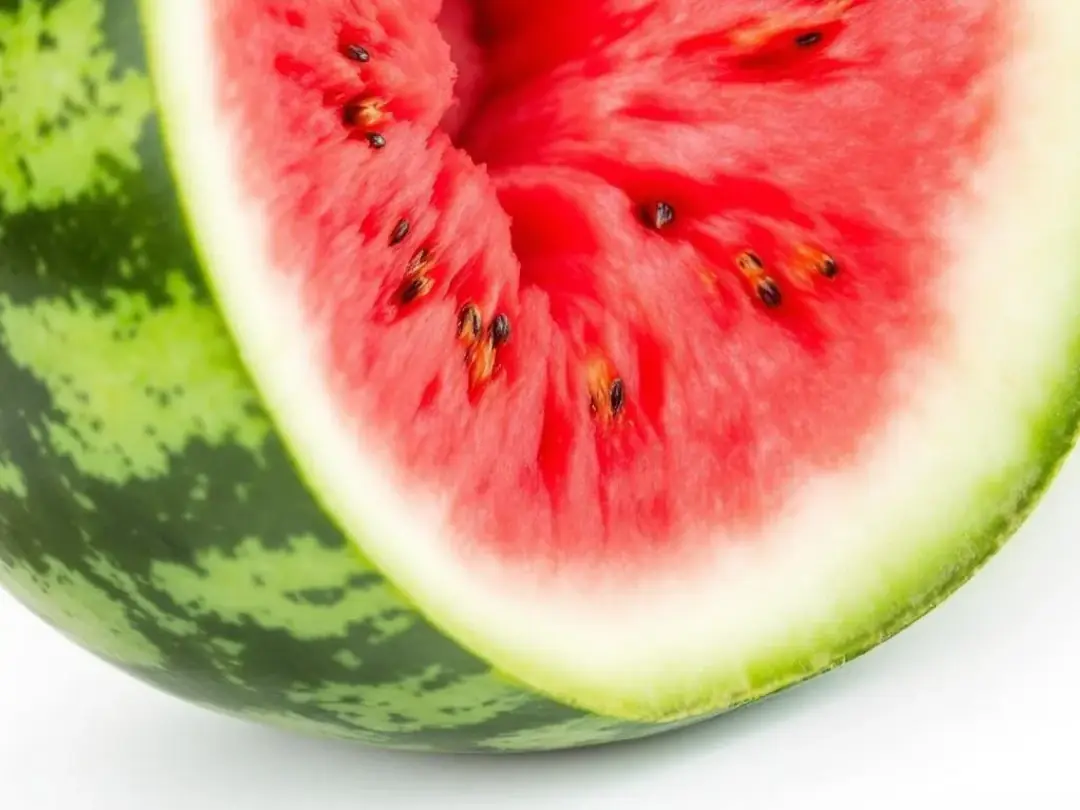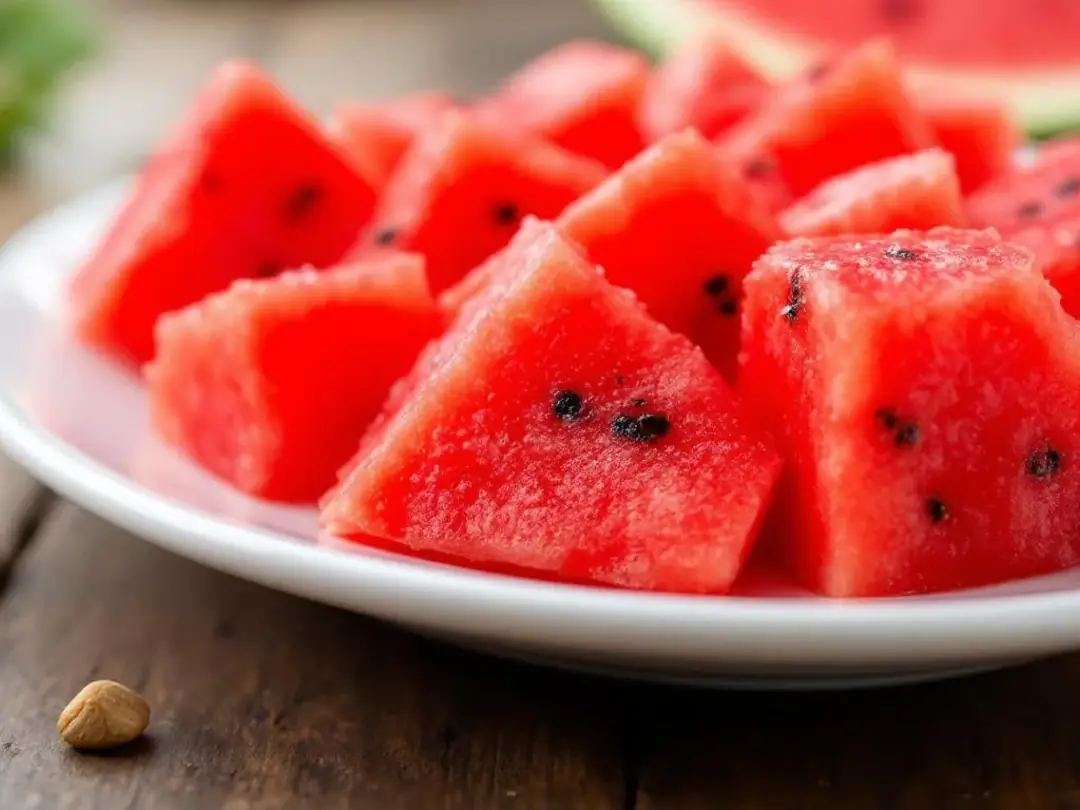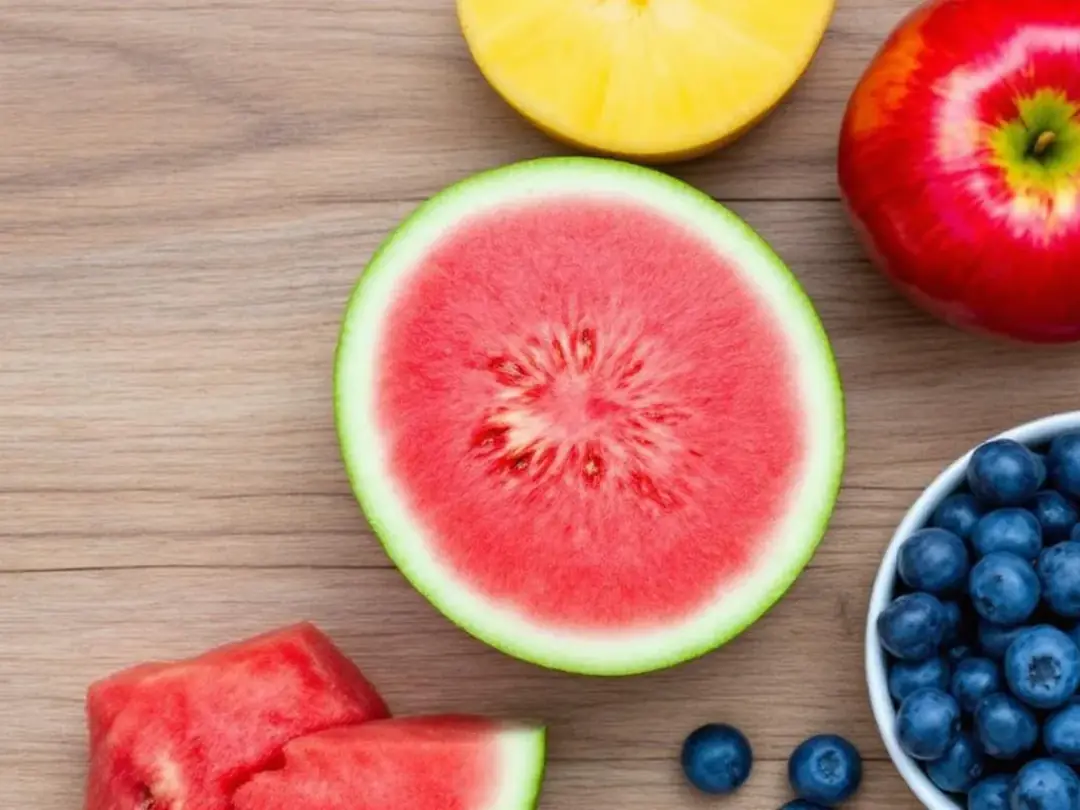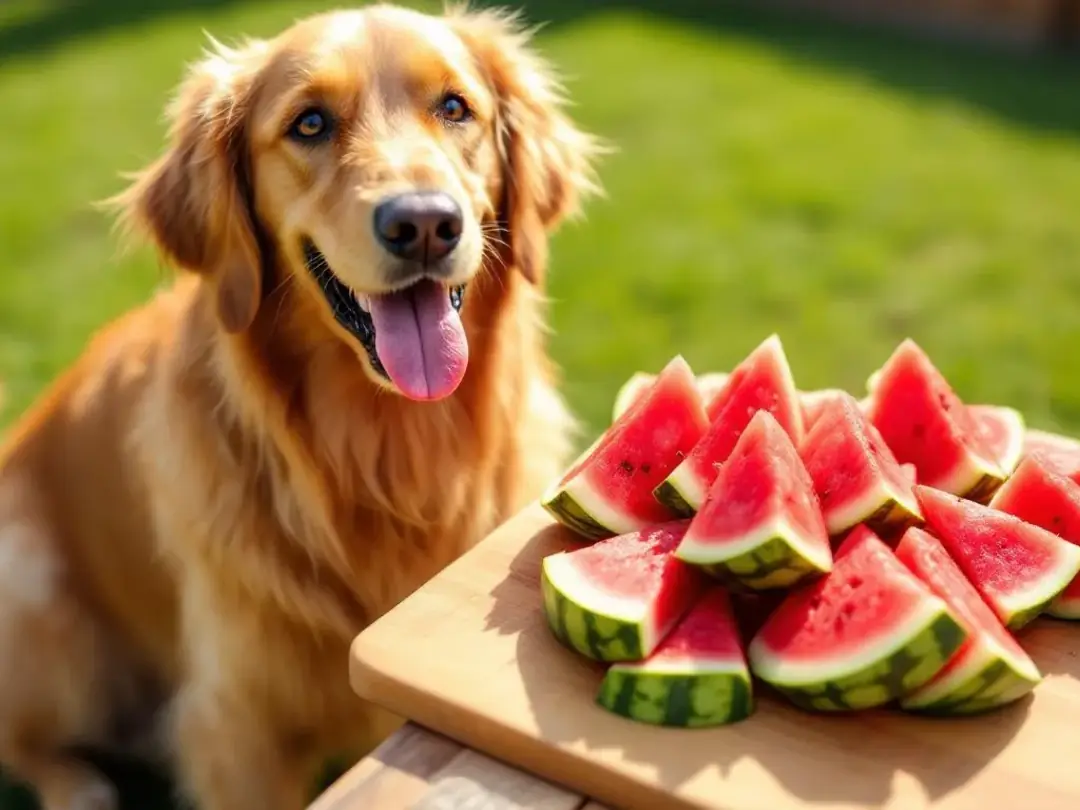Key Takeaways
-
Dogs can safely eat watermelon when properly prepared - seeds and rind must be completely removed
-
Watermelon is 92% water and packed with vitamins A, C, and potassium, making it an excellent hydrating treat
-
Treats should never exceed 10% of your dog's daily caloric intake - start with small 1-inch cubes
-
Always consult your veterinarian before introducing watermelon to dogs with diabetes or digestive sensitivities
-
Fresh watermelon flesh only - avoid seeds, rind, canned varieties, or products with added sugars
Is Watermelon Safe for Dogs?
Yes, fresh watermelon flesh is safe for healthy dogs when prepared correctly. This nutrient rich fruit offers several compelling benefits that make it an excellent addition to your dog's treat rotation. The 92% water content makes watermelon an outstanding hydrating snack during summer months, helping to prevent dehydration and support kidney function in active dogs.
With approximately 46 calories per cup, watermelon is low in calories and ideal for dogs managing their weight. Unlike many commercial treats that are high in fat and artificial ingredients, fresh watermelon provides natural nutrition without excessive calories that could contribute to weight gain.
Watermelon is rich in essential vitamins and minerals that support overall canine health. Vitamin A promotes healthy vision and immune system function, while vitamin C acts as a powerful antioxidant. The fruit also contains vitamin B6, which aids in protein metabolism, and potassium, crucial for proper muscle and heart function. Additionally, watermelon contains beneficial antioxidants like lycopene that help reduce inflammation throughout the body.
Both puppies and adult dogs can enjoy watermelon when given in appropriate portions. However, the key to safe watermelon consumption lies in proper preparation and portion control. Most dogs find watermelon to be a tasty treat, making it an excellent option for training rewards or special occasions.


Parts of Watermelon Dogs Should Never Eat
While the flesh of watermelon is safe for dogs, certain parts of this fruit pose serious health risks and should never be offered to your pet. Understanding these dangers is crucial for preventing potentially life-threatening complications.
Watermelon Seeds - Choking and Blockage Risk
Watermelon seeds present multiple hazards for dogs and should be completely avoided. These small, hard objects contain trace amounts of cyanide compounds that can be harmful when consumed in large quantities. More immediately concerning, watermelon seeds pose a serious choking hazard, particularly for small and medium-sized dogs whose airways can be easily obstructed.
Even if your dog manages to swallow watermelon seeds without choking, they can cause intestinal blockage - a medical emergency requiring immediate veterinary intervention. Dogs eat watermelon seeds instinctively, but these indigestible objects can clump together in the digestive tract, preventing normal food passage and potentially requiring emergency surgery to remove.
Even a few seeds can cause digestive upset, stomach pain, and discomfort. The risk increases significantly with smaller dogs, where even tiny white seeds can cause problems. For this reason, always choose seedless watermelon varieties when possible, or meticulously remove every single seed before offering watermelon to your dog.
Watermelon Rind - Digestive Danger
The watermelon rind - the tough, fibrous green and white outer portion - is impossible for dogs to digest properly and should never be given to pets. Unlike the soft flesh, watermelon rind maintains its hard, fibrous texture even after chewing, making it a prime candidate for causing severe gastrointestinal blockages.
When dogs eat watermelon rind, the material can become lodged in the digestive tract, requiring immediate veterinary intervention and potentially emergency surgery. Signs that your dog may have consumed rind include vomiting, loss of appetite, abdominal pain, lethargy, and difficulty defecating.
The rind's tough texture also presents a potential choking hazard, especially for dogs who tend to gulp their food quickly. If your dog accidentally consumes watermelon rind, contact your veterinarian immediately, even if no symptoms are present initially. Early intervention can prevent serious complications and reduce the need for invasive treatment.
How Much Watermelon Can Dogs Eat?
Determining how much watermelon your dog can safely consume depends on several factors, including your dog's size, weight, and overall health status. The general rule for all treats, including watermelon, is that they should never exceed 10% of your dog's daily calories. This ensures that treats don't interfere with your pet's balanced diet or contribute to unwanted weight gain.
For small dogs weighing under 20 pounds, limit watermelon to 1-2 tablespoons of cubed watermelon maximum per serving. These bite sized chunks should be offered no more than 2-3 times per week to prevent digestive upset. Small dogs have proportionally smaller digestive systems and are more susceptible to stomach upset from too much watermelon.
Medium dogs weighing between 20-50 pounds can safely enjoy 2-4 tablespoons of cubed watermelon maximum per serving. Again, this should be offered as an occasional treat rather than a daily snack. Monitor your dog's response and adjust portions accordingly if you notice any signs of digestive upset.
Large dogs weighing over 50 pounds, including extra large dogs, can consume up to 1/4 cup of cubed watermelon maximum per serving. While larger dogs can tolerate more watermelon, it's still important to respect the 10% daily calorie rule and consider your dog's individual tolerance.
When introducing watermelon for the first time, start with tiny amounts regardless of your dog's size. This allows you to monitor for any adverse reactions or sensitivities before offering larger portions. Some dogs may be more sensitive to the natural sugars in watermelon, while others might experience loose stools from the high water content.
Always consider your dog's weight when calculating appropriate portions. Overweight dogs should receive smaller amounts of watermelon to avoid contributing additional calories to their diet. If you're unsure about appropriate portion sizes for your dog's specific situation, consult with your veterinarian for personalized guidance.


How to Safely Prepare Watermelon for Dogs
Proper preparation is essential when offering watermelon to dogs. Following these step-by-step guidelines ensures your pet can enjoy this refreshing treat safely while minimizing any health risks.
Preparation Steps
Begin by washing the watermelon thoroughly under running water to remove any pesticides, bacteria, or surface contaminants that could make your dog sick. Even organic watermelons should be washed, as they can harbor bacteria from soil or handling during transport and storage.
Cut the watermelon into manageable pieces, aiming for cubes approximately 1 inch x 1 inch x ¼ inch thick. This size provides an appropriate serving portion while minimizing choking hazard risk. Avoid cutting pieces too large, especially for small dogs, as this could pose a potential choking hazard.
The most critical step is removing every single seed, including the small white seeds that many people overlook. Use a knife or spoon to carefully extract all seeds, taking extra time to ensure none remain. Even seeds that seem insignificant can cause problems for dogs, so thorough removal is essential.
Completely remove all green and white rind, leaving only the red or pink flesh. The rind should be discarded immediately to prevent accidental consumption. When prepared properly, only the soft, juicy interior should remain.
Serve the watermelon immediately fresh, or store covered in the refrigerator for up to 3 days. Fresh watermelon provides the best texture and nutritional value. Discard any leftover watermelon that shows signs of spoilage, unusual odor, or texture changes.
Creative Serving Ideas
Frozen watermelon treats offer an excellent way for dogs to enjoy this hydrating snack during hot days. Simply freeze watermelon cubes in ice cube trays or ice cube tray for individual servings. These frozen treats provide extended enjoyment while helping dogs cool down during summer heat.
For dogs who need encouragement to drink more water, try mashing watermelon and mixing it with their regular food. This adds natural flavor and moisture to dry kibble while providing additional hydration. The natural sweetness often appeals to picky eaters.
Create a hydrating smoothie by blending seedless watermelon with a small amount of water. This liquid treat can be particularly beneficial for dogs recovering from illness or those needing additional fluid intake. Pour the mixture into popsicle molds for a special frozen treat.
Stuffing frozen watermelon pieces into puzzle toys provides mental stimulation along with nutritional benefits. This approach encourages slower consumption while engaging your dog's natural foraging instincts. Kong toys and similar puzzle feeders work well for this purpose.
For special occasions, make homemade popsicles using pureed watermelon in silicone molds. These treats can be portioned appropriately for your dog's size and provide a refreshing alternative to commercial frozen treats that may contain artificial ingredients.


Health Benefits of Watermelon for Dogs
When offering watermelon to dogs, you're providing more than just a tasty treat - you're delivering significant nutritional and health benefits that can support your pet's overall wellbeing.
Hydration and Cooling
The 92% water content in watermelon makes it an exceptional hydrating snack, particularly valuable during hot summer days when dogs are at risk of dehydration. This high water content helps maintain proper fluid balance and supports kidney function, especially important for active dogs or those spending time outdoors.
The natural cooling effect of watermelon helps dogs regulate their body temperature during warm weather. Unlike plain water, watermelon provides hydration along with natural electrolytes, making it an excellent choice for dogs who may be reluctant to drink adequate amounts of water.
For dogs who are picky about their water intake, watermelon can encourage increased fluid consumption. The appealing taste and texture often motivate dogs to consume more moisture than they would through water alone, supporting proper hydration levels.
The hydrating properties of watermelon also support healthy skin and coat condition. Adequate hydration from the inside out helps maintain skin elasticity and coat shine, particularly noticeable in dogs living in dry climates or heated indoor environments.
Essential Vitamins and Minerals
Watermelon provides several essential vitamins that support various aspects of canine health. Vitamin A, abundant in watermelon, supports healthy vision, immune system function, and skin health. This vitamin is particularly important for growing puppies and senior dogs whose immune systems may need additional support.
Vitamin C acts as a powerful antioxidant, helping to neutralize harmful free radicals and support immune system function. While dogs can produce their own vitamin C, additional dietary sources can be beneficial during times of stress, illness, or recovery.
Vitamin B6 plays a crucial role in protein metabolism and brain function. This vitamin supports proper nervous system function and helps convert food into energy, particularly important for active dogs or those with high energy requirements.
The potassium content in watermelon supports proper muscle and heart function. This essential mineral helps maintain proper electrolyte balance and supports cardiovascular health, particularly important for senior dogs or those with heart conditions.
Watermelon also contains lycopene, a powerful antioxidant that provides anti-inflammatory benefits and may support heart health. This compound gives watermelon its red color and offers protective effects against cellular damage throughout the body.
Potential Risks and When to Avoid Watermelon
While watermelon is generally safe for healthy dogs, certain situations and health conditions warrant caution or complete avoidance of this fruit.
Dogs Who Should Avoid Watermelon
Diabetic dogs should avoid watermelon due to its natural sugar content, which can cause blood glucose spikes even though the sugars are diluted by high water content. The fructose in watermelon can still affect blood sugar levels, making it inappropriate for dogs managing diabetes. Always consult your veterinarian before offering any fruits to diabetic pets.
Dogs with known fruit allergies or food sensitivities should not be given watermelon until cleared by a veterinarian. While fruit allergies are relatively uncommon in dogs, they can occur and may cause serious allergic reactions including hives, swelling, or digestive upset.
Dogs with chronic digestive issues, inflammatory bowel disease, or sensitive stomachs may experience gastrointestinal upset from watermelon. The high water content and natural fiber can exacerbate digestive problems in susceptible animals, leading to diarrhea or stomach discomfort.
Overweight dogs should receive only minimal portions of watermelon, if any, due to the natural sugar content that can contribute to weight gain. While watermelon is relatively low in calories, the sugars can still add unwanted calories to a weight management diet.
Signs of Watermelon-Related Problems
Monitor your dog closely for signs of digestive upset following watermelon consumption. Diarrhea or loose stools within 6-12 hours of eating watermelon may indicate that your dog consumed too much or has sensitivity to the fruit. Reduce portion sizes or discontinue offering watermelon if digestive issues persist.
Vomiting, excessive drooling, or signs of nausea following watermelon consumption warrant immediate attention. These symptoms could indicate an allergic reaction, overconsumption, or accidental ingestion of seeds or rind.
Bloating, gas, or visible abdominal discomfort may signal digestive upset or, in severe cases, intestinal blockage from seeds or rind. If these symptoms persist or worsen, contact your veterinarian immediately.
Watch for allergic reaction signs including hives, itching, facial swelling, or difficulty breathing. While rare, dogs allergic to watermelon may experience serious reactions requiring immediate veterinary care.
Loss of appetite or lethargy following watermelon consumption could indicate digestive upset or other complications. If your dog seems unwell after eating watermelon, stop feeding the fruit and consult your veterinarian.
Special Considerations for Puppies
Puppies eat watermelon with the same enthusiasm as adult dogs, but their developing digestive systems require extra caution and smaller portions. Young dogs can generally tolerate watermelon starting around 12 weeks of age, but introduction should be gradual and carefully monitored.
Developing digestive systems in puppies are more sensitive to new foods than mature adult dogs. The high water content and natural sugars in watermelon can cause digestive upset more easily in young animals, making portion control even more critical.
Start with tiny pieces - smaller than the recommended portions for adult dogs of similar size. A piece no larger than your puppy's thumbnail is appropriate for initial introduction. This allows you to assess tolerance without overwhelming their developing digestive system.
Monitor your puppy closely for 24 hours after first introducing watermelon. Watch for any signs of digestive upset, changes in stool consistency, or behavioral changes that might indicate discomfort or adverse reaction.
Before introducing watermelon or any new treats to puppies under 6 months old, consult your veterinarian. Young puppies have specific nutritional requirements for proper growth and development, and treats should not interfere with their primary nutrition from puppy-formulated food.
Ensure that watermelon treats don't interfere with essential puppy nutrition. Treats should remain a minimal part of a puppy's diet, with the majority of calories coming from complete and balanced puppy food designed to support proper growth and development.


Watermelon vs Other Safe Fruits for Dogs
Understanding how watermelon compares to other dog-safe fruits helps pet owners make informed decisions about treat variety and nutritional benefits.
| Fruit | Water Content | Calories (per 100g) | Key Benefits | Preparation Notes |
|---|---|---|---|---|
| Watermelon | 92% | 30 | High hydration, low calories | Remove seeds and rind |
| Apples | 86% | 52 | Fiber, vitamin C | Remove seeds and core |
| Blueberries | 84% | 57 | Antioxidants, fiber | Serve whole (small dogs: halved) |
| Bananas | 75% | 89 | Potassium, fiber | Remove peel, high sugar |
| Watermelon offers significantly higher water content than most other dog-safe fruits, making it the superior choice for hydration support. This makes watermelon particularly valuable during hot weather or for dogs who need encouragement to increase fluid intake. |
The calorie content of watermelon is lower than many other fruits commonly fed to dogs. Bananas, while nutritious, contain nearly three times the calories of watermelon, making watermelon a better choice for dogs managing their weight or those receiving multiple treats throughout the day.
Compared to toxic fruits like grapes, which should never be fed to dogs, watermelon presents no known toxicity risks when properly prepared. This safety profile, combined with its nutritional benefits, makes watermelon an excellent choice for pet owners seeking natural, healthy treat options.
Watermelon's preparation requirements are straightforward compared to fruits requiring extensive peeling or seed removal. While apples require core and seed removal, and stone fruits need pit extraction, watermelon simply needs seed and rind removal, making it relatively easy to prepare safely.
The vitamin profile of watermelon is similar to cantaloupe but with superior hydration benefits. Both melons provide vitamins A and C, but watermelon's higher water content gives it an advantage for dogs needing additional hydration support.
When to Contact Your Veterinarian
Certain situations involving watermelon consumption require immediate veterinary attention to prevent serious health complications.
Contact your veterinarian immediately if your dog accidentally consumed watermelon seeds or rind, even if no symptoms are currently present. These materials can cause intestinal blockage, and early intervention often leads to better outcomes than waiting for symptoms to develop.
Signs of intestinal blockage typically appear within 24-48 hours of consumption and include vomiting, loss of appetite, straining to defecate, abdominal pain, and lethargy. If any of these symptoms occur after your dog has eaten watermelon, seek veterinary care immediately.
Persistent vomiting or diarrhea lasting more than 12 hours following watermelon consumption warrants veterinary evaluation. While mild digestive upset may resolve on its own, prolonged symptoms can lead to dehydration and other complications requiring medical intervention.
Allergic reaction symptoms including difficulty breathing, facial swelling, hives, or collapse require emergency veterinary care. While rare, allergic reactions to watermelon can be serious and potentially life-threatening without prompt treatment.
Before introducing watermelon to dogs with existing health conditions such as diabetes, kidney disease, or digestive disorders, consult your veterinarian. These conditions may contraindicate watermelon consumption or require special preparation or portion modifications.
If you're unsure about appropriate portion sizes for your dog's weight, age, or health status, veterinary guidance can help establish safe serving amounts. This is particularly important for puppies, senior dogs, or those with special dietary requirements.
Dogs with a history of dietary indiscretion or those who frequently consume inappropriate items should be evaluated before introducing new treats like watermelon. Some dogs may require supervised feeding or modified preparation techniques to ensure safety.
FAQ
Can dogs eat watermelon juice?
No, avoid watermelon juice as it's concentrated in sugars and lacks the fiber that helps slow sugar absorption. Commercial watermelon juice often contains added sugars or preservatives that can be harmful to dogs. Stick to fresh watermelon flesh only, which provides hydration benefits along with beneficial fiber and nutrients in their natural proportions.
Is yellow watermelon safe for dogs?
Yes, yellow watermelon varieties are just as safe as red watermelon when properly prepared, offering similar nutritional benefits and hydration properties. The color difference comes from different antioxidant compounds, but both varieties provide the same vitamins, minerals, and water content. Apply the same preparation rules: remove all seeds and rind completely.
How long can I store cut watermelon for my dog?
Cut watermelon should be used within 3 days when stored covered in the refrigerator. After this time, bacterial growth increases and nutritional quality decreases. Always discard watermelon that shows any signs of spoilage, unusual odor, slimy texture, or color changes, as these indicate bacterial contamination that could make your dog sick.
Can I give my dog watermelon every day?
While watermelon is safe when properly prepared, daily feeding isn't recommended for maintaining optimal dietary balance. Offer watermelon 2-3 times per week maximum to prevent digestive upset and ensure treats don't exceed 10% of your dog's daily caloric intake. Variety in treats also provides broader nutritional benefits and prevents overconsumption of any single food.
What should I do if my dog ate watermelon seeds accidentally?
Monitor your dog closely for signs of digestive distress including vomiting, loss of appetite, straining to defecate, or abdominal pain. Contact your veterinarian if any of these symptoms appear within 24-48 hours, as seeds can cause intestinal blockage requiring emergency treatment. The risk is higher for small dogs, but any dog consuming multiple seeds should be evaluated by a veterinary professional.






